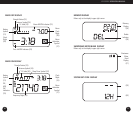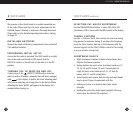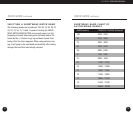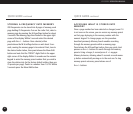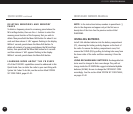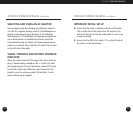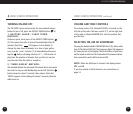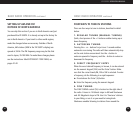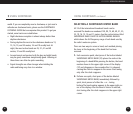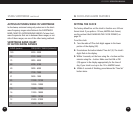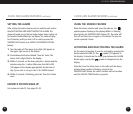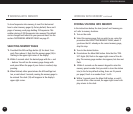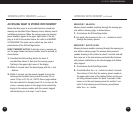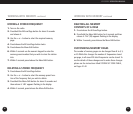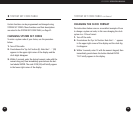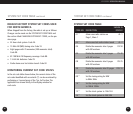
5 USING SHORTWAVE
USING SHORTWAVE continued
SELECTING A SHORTWAVE METER BAND
All 14 of the international broadcast bands can be
accessed.The bands are numbered 120, 90, 75, 60, 49, 31, 25,
22, 19, 16, 15, 13 and 11 meters. See the section below titled
SHORTWAVE BAND CHART OF AUTOSCANNING RANGES
which shows the full frequency range of each band used by
the radio’s autoscan system.
There are two ways to access a band, each method placing
the tuner at the beginning of the band that has been
accessed.
1. Each successive quick, short press of the button labeled
SHORTWAVE METER BAND (10) places the radio at the
beginning of a band.While pressing the button, the band
number shows in the upper right corner of the display
(37) and disappears a few seconds after it is released,
causing the clock to reappear in the corner. Start tuning
only after the clock reappears.
2. Perform one quick, short press of the button labeled
SHORTWAVE METER BAND, immediately followed by
quick, short presses of either the + or – tuning
buttons.The band number appears in the upper right cor-
ner of the display.After the band of choice is selected,
start tuning after the clock reappears in the upper right
corner.
27
world. If you are completely new to shortwave, or just need a
refresher on shortwave basics, please see the SHORTWAVE
LISTENING GUIDE that accompanies this product.To get you
started, some basics are noted below
• Night shortwave reception is almost always better than
daytime shortwave.
• During daytime the most active shortwave bands are 13,
15, 16, 19, and 22 meters, 16 and 19 usually best.At
night, the most active bands are 25, 31, 41 and 49
meters, 31 and 49 usually best
• Around sunset and sunrise, both the day and night bands
may be good, sometimes exceptionally good. Listening at
these times can often be quite rewarding
• Signal strengths are often stronger when holding the
radio and being very close to a window
26
YB 550PE OPERATION MANUAL



